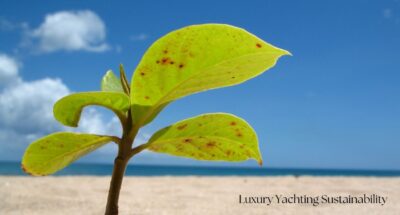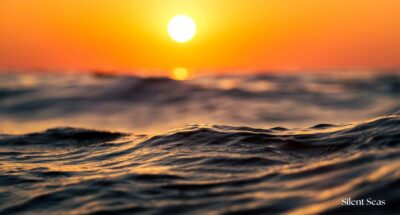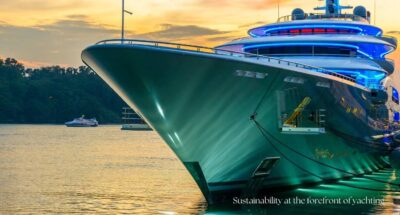Luxury yachting and environmental responsibility can go hand-in-hand with a few thoughtful upgrades and practices. By making eco-friendly choices, yacht owners can reduce their environmental impact while still enjoying the pleasures of the open sea. From sustainable materials to energy-efficient practices, there are simple yet effective ways to green your yacht and protect our oceans. Here’s how to get started with these seven easy steps.
1. Install Solar Panels ☀️
Description: Solar panels can be installed on the yacht’s roof or deck to harness energy from the sun. This renewable power source can be used to run various systems on board, reducing the need for fuel-powered generators and cutting down emissions.
Why It’s Important: Solar power is a clean, renewable energy source that’s perfect for sunny days on the water. By using solar panels, you’ll reduce your fuel consumption and minimize pollution.
Action Step: Consult a marine specialist to determine the best solar panel options for your yacht. Look for panels designed for marine use that are both efficient and durable, and consider starting with a small solar setup for non-critical power needs.
2. Switch to Eco-Friendly Cleaning Products 🧼
Description: Traditional cleaning products often contain harsh chemicals that can harm marine life when they’re rinsed off into the ocean. Switching to biodegradable, eco-friendly cleaning products is a simple way to make your yacht more sustainable.
Why It’s Important: Eco-friendly cleaning products help reduce the number of toxins entering the water, protecting marine ecosystems and preserving the quality of the oceans.
Action Step: Replace all cleaning supplies on board with biodegradable, non-toxic options. Look for products specifically labeled as “marine-safe” and ensure the crew understands the importance of using these alternatives.
3. Upgrade to LED Lighting 💡
Description: Replacing traditional lights with LED bulbs on your yacht is a quick and effective way to conserve energy. LEDs use significantly less power than standard bulbs and last much longer, reducing the need for frequent replacements.
Why It’s Important: Using LED lighting cuts down on your yacht’s power consumption, which is especially beneficial if you’re running on solar power or aiming to reduce generator use. It’s an easy way to save energy and lower your overall environmental impact.
Action Step: Start by replacing high-use lights like cabin lighting and exterior fixtures with marine-grade LED bulbs. Over time, replace all onboard lights to maximize energy savings.
4. Use Sustainable or Recyclable Tableware 🍽️
Description: Opting for reusable or biodegradable tableware instead of single-use plastics is a simple yet impactful change. This includes dishes, cups, utensils, and even napkins, reducing the amount of waste generated on board.
Why It’s Important: Eliminating single-use plastics reduces plastic pollution, which is a major threat to marine life. Sustainable tableware options help keep plastic waste out of the ocean.
Action Step: Stock your yacht with durable, reusable tableware or biodegradable options made from bamboo or recycled materials. Consider switching to cloth napkins as an added eco-friendly touch.
5. Install a Water Filtration System 🚰
Description: A water filtration system allows you to purify seawater or tap water on board, reducing the need for single-use plastic water bottles. This ensures you have access to fresh drinking water without the environmental toll of disposable plastics.
Why It’s Important: Filtering your own water drastically reduces plastic waste, keeping disposable bottles out of the ocean and off beaches. It’s also convenient, as you won’t have to stock up on bottled water for each trip.
Action Step: Explore marine-grade water filtration systems that can be installed on your yacht. Make sure to regularly maintain the filters to ensure clean, safe drinking water for everyone on board.
6. Use Eco-Friendly Paints and Coatings 🎨
Description: Many conventional paints and coatings contain harmful chemicals that can leach into the water, affecting marine life. Opting for eco-friendly, non-toxic paints and anti-fouling coatings reduces this impact and helps maintain cleaner waters.
Why It’s Important: Eco-friendly coatings protect the hull from biofouling without releasing toxic substances into the ocean, supporting marine biodiversity.
Action Step: When repainting or maintaining your yacht, choose non-toxic or low-toxicity marine coatings. Look for eco-certified anti-fouling options specifically designed to protect marine ecosystems.
7. Practice Responsible Waste Disposal ♻️
Description: Properly managing waste on board is crucial to avoid polluting the ocean. This includes separating recyclables, properly disposing of hazardous materials, and ensuring no waste is dumped overboard.
Why It’s Important: Responsible waste disposal keeps trash, chemicals, and other pollutants out of the ocean, preserving water quality and marine life.
Action Step: Set up a waste management system on board, including labeled bins for recycling, composting, and general waste. Educate your crew and guests on proper waste disposal practices to ensure everyone contributes to a cleaner environment.
Embracing these eco-friendly practices is a meaningful way to enjoy the luxury of yachting while respecting the beauty of the ocean. By making these small but impactful changes, you’ll reduce your environmental footprint and help protect marine ecosystems for future generations. Let your yacht be a vessel for positive change on the open seas!
Do you have any feedback or additional insights? Please send an email to editor @ yachtsurf.com





